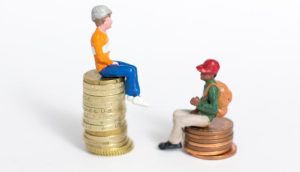Rising inequality could drive racism – new study warns
Inequality in Australia has the potential to drive down social cohesion bringing with it the risk of adverse relations between groups, including immigrants and ethnic minorities, new research claims.
The latest Scanlon Institute Social Cohesion Insight on ‘Inequality and the Fair Go in Australia’ says that that Australians’ sense of pride, national belonging, and social justice is on the decline – and, unequivocally, that social and economic inequalities are weighing down overall social cohesion.
“Scholars have long argued that identifying with Australia as a nation depends on the perception of a just and fair society, with equal opportunity for all,” the report says.
“Ideals of fairness and egalitarianism go hand in hand and have often been positioned within cultural narratives about what it means to be Australian – there is an expectation that all citizens have their basic needs met,” report author John van Kooy says.
 But the report said people who were struggling financially in 2022 had a lower sense of belonging than those who were prospering.
But the report said people who were struggling financially in 2022 had a lower sense of belonging than those who were prospering.
“This was also true of people who were unemployed – compared to people who were employed or retired – and people who were renting or paying off a mortgage – compared to people who owned a house outright,” it said.
“People who had gone without meals at any point in the last 12 months were also more likely to have a low sense of belonging in Australia.”
Inequality has also weighed down respondents’ sense of pride in the Australian way of life. Since the Scanlon social cohesion surveys commenced, people who were struggling financially have had significantly lower levels of national pride than those who were prospering.
“These findings resonate with international research that shows how inequality can drive down social cohesion—with the risk of adverse relations between groups, including immigrants and ethnic minorities,” the report says.
“Indeed, previous editions of Social Cohesion Insights have shown that people who are financially struggling have lower levels of trust in others and are more likely to have negative views about the number of immigrants accepted into Australia,” it says.
The report says that while individual financial or household circumstances can impact on the sense of pride or belonging in Australia, it can also affect broader perceptions of the ‘fair go’.
“For example, since 2007, the Scanlon surveys have asked respondents to indicate the extent to which they agree that ‘Australia is a land of economic opportunity where in the long run, hard work brings a better life.’ The question references the long-standing egalitarian ethos which suggests that all Australians’ skills can be utilised for collective well-being,” the report said.
“Like belonging and pride, answers to this question have been trending downwards. While the first wave of telephone surveys in 2007 indicated that 84 per cent of respondents agreed or strongly agreed that hard work brings a better life in Australia, by 2022, online surveys showed this proportion had fallen to 69 per cent,” it said.
Read the full report here: Social Cohesion Insights 06: Inequality and the ‘Fair Go’ in Australia | Scanlon institute












